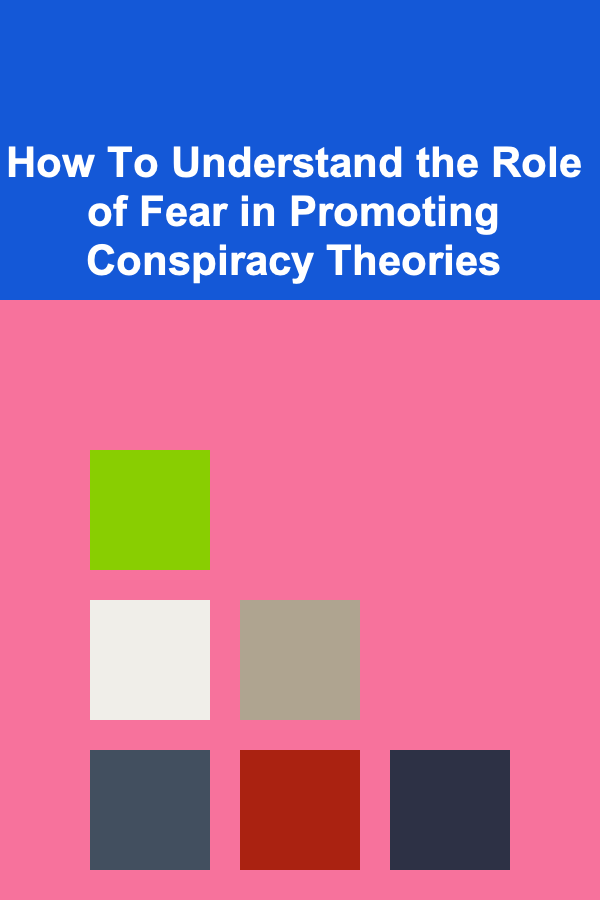
How To Understand the Role of Fear in Promoting Conspiracy Theories
ebook include PDF & Audio bundle (Micro Guide)
$12.99$9.99
Limited Time Offer! Order within the next:

Conspiracy theories have always been a part of human history, manifesting in various forms across cultures, time periods, and social structures. These theories, which often provide alternative explanations to significant events or widespread phenomena, have become increasingly prevalent in the modern digital age. But what fuels the growth and spread of such theories? One critical, yet frequently overlooked, factor is fear.
Fear has an undeniable influence on human cognition, behavior, and social interactions. It can shape how individuals perceive the world, react to information, and make decisions. In the case of conspiracy theories, fear is not merely a byproduct of these beliefs but a driving force that nurtures their development and persistence. This article delves into the complex relationship between fear and conspiracy theories, examining how fear fosters these beliefs, why fear makes conspiracy theories compelling, and the societal consequences of such dynamics.
The Nature of Fear and Its Psychological Impact
To understand the role of fear in promoting conspiracy theories, it's important to first explore the nature of fear itself. Fear is an emotional response to a perceived threat or danger, whether physical, psychological, or social. Evolutionarily, fear served an adaptive function: it triggered the "fight or flight" response, preparing humans to confront or escape danger. However, in the modern world, fear is often triggered by less tangible threats, such as social changes, economic uncertainty, or political instability.
Psychologically, fear can have profound effects on cognition and decision-making. When individuals feel threatened or anxious, they tend to look for ways to regain control or make sense of their environment. This is where conspiracy theories come in. Conspiracy theories provide a sense of certainty and control by offering explanations that seem to make sense of chaos, uncertainty, and anxiety.
Fear of the Unknown
One of the most powerful catalysts for fear is uncertainty. Humans have a natural aversion to the unknown, as it threatens their ability to predict and control their environment. When faced with complex, ambiguous, or unexplained events, people often feel vulnerable. The lack of clear answers creates anxiety and discomfort, pushing individuals to seek explanations that can provide some level of certainty.
Conspiracy theories, with their neatly packaged, often simple explanations, offer a way to make sense of the unknown. They provide a narrative in which the chaos and confusion of the world can be attributed to a hidden, malevolent force. This shift from uncertainty to certainty alleviates anxiety and gives individuals a sense of understanding, even if that understanding is based on falsehoods.
Fear of Vulnerability and Powerlessness
Another fear that plays a key role in the formation and spread of conspiracy theories is the fear of vulnerability and powerlessness. In a rapidly changing world---where people feel out of control of their circumstances, whether due to political decisions, economic instability, or global crises---conspiracy theories provide a way to externalize this fear. Instead of acknowledging their own vulnerability or feeling powerless in the face of overwhelming systems, individuals turn to conspiracy theories to make sense of their feelings of helplessness.
By attributing these feelings to powerful elites or shadowy organizations, conspiracy theories offer a sense of agency. Individuals may believe that by uncovering these conspiracies, they can take control of their own fate or, at the very least, shield themselves from manipulation. This feeling of control, even if illusory, can be incredibly comforting, especially during times of social unrest or personal crisis.
How Fear Fuels the Spread of Conspiracy Theories
The psychological mechanisms of fear not only influence individuals' beliefs but also play a crucial role in how conspiracy theories spread. Fear is contagious, often amplified through media, social networks, and group dynamics, which can escalate an individual's belief in conspiracies.
Media Amplification and Social Media
In today's digital age, fear is often amplified through social media platforms, where information---true or false---spreads rapidly and widely. Social media platforms thrive on engagement, and content that evokes strong emotional responses, particularly fear, tends to generate more interactions (likes, shares, comments). As a result, conspiracy theories that play into people's fears have a higher chance of going viral.
The algorithms of social media platforms also tend to prioritize content that generates strong emotional reactions, which creates a feedback loop where individuals are constantly exposed to fear-inducing content. For example, fear-driven conspiracy theories about government control, health scares, or economic collapse are shared, liked, and commented on, further spreading these ideas to larger audiences.
Echo Chambers and Confirmation Bias
Once individuals start engaging with conspiracy theories, social media platforms often place them in "echo chambers," or communities of like-minded individuals. These echo chambers reinforce their beliefs, making it difficult to challenge or scrutinize the conspiracy theories they subscribe to. In such environments, the fear-driven narratives of conspiracy theories are constantly reinforced, creating a cycle that perpetuates and intensifies individuals' belief in them.
Moreover, the human tendency to seek information that confirms pre-existing beliefs, known as confirmation bias, plays a significant role in the spread of fear-based conspiracy theories. When individuals are afraid, they tend to gravitate toward information that validates their fears, even if that information is inaccurate or misleading. This bias makes it easier for conspiracy theories to take hold and grow in popularity.
Group Identity and Fear of the Other
Fear of the unknown can also extend to fear of the "other," whether that is a political group, an ethnic group, or a perceived enemy. Conspiracy theories often frame the world as a battle between "us" (the good people) and "them" (the sinister forces conspiring against us). This binary worldview reinforces group identity and stokes fear of those who are seen as different or threatening.
In many cases, conspiracy theories target marginalized or stigmatized groups, using fear to foster distrust and hostility. For example, conspiracy theories about immigrants, racial or religious minorities, or foreign governments often rely on exaggerated or fabricated threats to incite fear. This fear then becomes a tool for creating division, cementing social or political divides, and justifying discriminatory or violent behavior.
Fear of Rejection or Being Alone
For some individuals, the fear of being ostracized or misunderstood can lead them to embrace conspiracy theories. Humans have an innate desire to belong to groups, and belief in conspiracy theories can provide a sense of community and solidarity. In these groups, individuals may find others who share their fears and anxieties, reinforcing their belief in the conspiracy.
For example, a person who feels alienated from mainstream society or who struggles with feelings of powerlessness may find comfort in online conspiracy communities that validate their fears. These communities can act as a support network, offering a sense of belonging in the face of societal rejection. In this sense, the fear of rejection can drive individuals further into the arms of conspiracy theories, where they feel understood and accepted.
Why Fear Makes Conspiracy Theories Compelling
The allure of conspiracy theories lies in their ability to offer simple, clear answers to complex and frightening questions. Fear creates an emotional need for clarity, certainty, and control, and conspiracy theories provide these in abundance.
The Appeal of the "Truth" Behind the Veil
Conspiracy theories often present themselves as the "truth" hidden behind a veil of lies. For those who are afraid, the idea that there is an elite or shadowy group orchestrating events from behind the scenes can be compelling. It provides a sense that there is something more significant at play than random chance or confusion. The belief that one has access to this hidden knowledge offers a sense of power and superiority over others who are "ignorant" or "deceived."
This "truth" often appeals to individuals' desire to feel special or unique, as though they have access to secret knowledge that others don't. In this sense, fear acts as a motivator, not just for the belief in conspiracy theories but for the desire to believe in them in the first place.
Reducing Complexity and Providing Certainty
In a world full of uncertainty and complexity, conspiracy theories provide a simplified version of events. They distill complicated social, political, or scientific issues into binary narratives of good versus evil, which are easier to understand and digest. Fear of the unknown or of being unable to make sense of the world drives individuals to seek out these simplistic explanations.
Conspiracy theories reduce the cognitive load required to process complex information. Instead of engaging with nuanced, multifaceted issues, individuals can embrace a conspiracy theory that offers a neat, tidy answer. This simplicity is particularly attractive during times of crisis or instability, where fear makes it difficult to cope with ambiguity and uncertainty.
Control and Agency in an Uncertain World
As previously mentioned, fear often stems from a lack of control. Conspiracy theories offer a false sense of agency, allowing individuals to believe that they can understand or influence the forces that govern their lives. By uncovering the supposed "truth" behind conspiracies, people feel empowered to take action, whether that's spreading the theory, joining like-minded communities, or even engaging in political activism. This sense of control can be particularly appealing to those who feel powerless or vulnerable in their everyday lives.
The Societal Consequences of Fear-Driven Conspiracy Theories
While the individual psychological effects of fear and conspiracy theories are significant, the societal consequences are even more profound. Fear-driven conspiracy theories can destabilize communities, undermine trust in institutions, and foster social division.
Undermining Trust in Institutions
Conspiracy theories often target societal institutions such as the government, the media, and scientific organizations. By promoting the idea that these institutions are involved in nefarious plots, conspiracy theories erode public trust in the systems that govern and organize society. This lack of trust can lead to widespread disillusionment, cynicism, and apathy toward critical societal issues.
In an era where trust in institutions is already fragile, fear-driven conspiracy theories can further exacerbate this problem. The more people believe in these theories, the less likely they are to trust expert opinions, evidence-based policies, or public health recommendations. This creates a dangerous cycle of skepticism, which can lead to increased polarization and social unrest.
Political Polarization and Social Division
Fear-driven conspiracy theories often thrive in politically polarized environments. They prey on individuals' existing fears and biases, deepening divisions between different groups. When conspiracy theories become entrenched in political discourse, they can lead to heightened tensions, hostile rhetoric, and even violent confrontations.
For example, conspiracy theories about election fraud, governmental control, or social movements can create an "us versus them" mentality, which intensifies societal divisions. This makes it more difficult to find common ground or engage in constructive dialogue, further fracturing social cohesion.
The Erosion of Public Health and Safety
One of the most damaging consequences of fear-driven conspiracy theories is their impact on public health and safety. Conspiracy theories related to vaccines, for instance, have led to a decline in vaccination rates, putting vulnerable populations at risk. Fear of government control, misinformation about medical treatments, or suspicion of scientific authorities can result in dangerous decisions, such as refusing vaccines or avoiding medical treatment.
The COVID-19 pandemic is a prime example of how fear-driven conspiracy theories can undermine public health efforts. False beliefs about the virus's origin, spread, and treatment have contributed to widespread misinformation, delayed responses, and preventable deaths. The societal consequences of these theories go beyond individual beliefs---they have real-world impacts on the health and well-being of entire populations.
Conclusion
The role of fear in promoting conspiracy theories is multifaceted and complex. Fear shapes how individuals perceive the world, interpret events, and make decisions. Conspiracy theories offer a way to cope with uncertainty, provide a sense of control, and make sense of the chaos that fear often brings. However, these theories also have profound societal consequences, undermining trust in institutions, deepening political divisions, and jeopardizing public health and safety.
Understanding the role of fear in conspiracy theories is essential for addressing the growing prevalence of these beliefs. By addressing the underlying fears that fuel conspiracy theories and promoting critical thinking, media literacy, and social cohesion, society can mitigate the harmful effects of these beliefs and work toward a more informed and unified future.

Effective Strategies for Event Managers: Mastering Logistics and Coordination
Read More
How to Decorate a Small Space for the Holidays
Read More
How to Train Your Pet for Better Behavior and Bonding
Read More
How To Apply Skepticism to Everyday Beliefs
Read More
Building a Resilient Investment Portfolio
Read More
10 Tips for Mastering Lo-Fi Music
Read MoreOther Products

Effective Strategies for Event Managers: Mastering Logistics and Coordination
Read More
How to Decorate a Small Space for the Holidays
Read More
How to Train Your Pet for Better Behavior and Bonding
Read More
How To Apply Skepticism to Everyday Beliefs
Read More
Building a Resilient Investment Portfolio
Read More